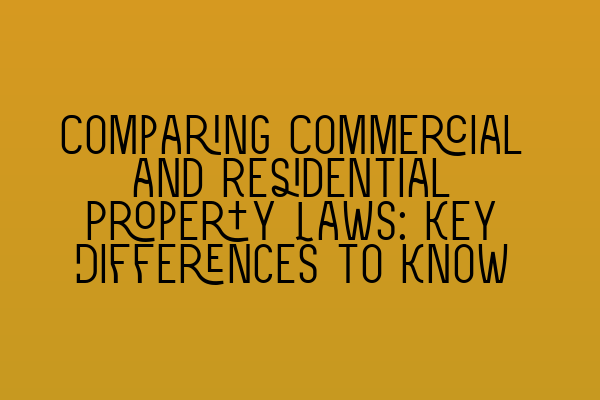When it comes to property law, there are various areas of specialization, and two key categories are commercial and residential property law. Both areas involve legal matters related to properties, but they have distinct differences that professionals in the field need to be aware of.
In this blog post, we will compare commercial and residential property laws, highlighting the key differences between them. Understanding these differences is crucial for any solicitor or lawyer practicing property law, as it enables them to provide effective and accurate legal advice to their clients.
Definition and Scope
The first and most fundamental difference between commercial and residential property laws lies in how they are defined and their scope of application.
Commercial property law deals with legal matters related to properties used for business purposes. This includes offices, retail spaces, industrial buildings, and any property utilized for commercial activities.
On the other hand, residential property law revolves around legal issues concerning properties used for habitation. This encompasses houses, apartments, condominiums, and any property designated for residential purposes.
It’s important to note that while commercial property law focuses on properties used for business, the presence of residential units within commercial buildings can introduce elements of both areas of law.
Lease Terms and Agreements
One of the key differences between commercial and residential property laws is the nature of lease terms and agreements.
In commercial property law, leases tend to be more extensive and demand a higher level of negotiation between landlords and tenants. Lease agreements for commercial properties regularly involve clauses related to rental rates, operating expenses, property maintenance, and the duration of the lease.
Residential property law, on the other hand, typically involves standard lease agreements that focus primarily on rental rates, terms of occupancy, and provisions related to tenant rights and responsibilities. These agreements are often more straightforward compared to commercial leases.
If you want to learn more about the intricacies of lease agreements and how to draft them effectively, our SQE 1 Practice Exam Questions can help you enhance your knowledge in this area.
Tenant Rights and Protections
Tenant rights and protections are another crucial distinction between commercial and residential property laws.
In residential property law, tenants enjoy extensive legal protections to ensure fair treatment and prevent landlord abuse. These protections include regulations regarding security deposits, eviction procedures, habitability standards, and the right to privacy.
Commercial property law offers fewer statutory protections for tenants, giving landlords greater flexibility in negotiating lease terms. Commercial tenants generally have less protection against eviction, and lease agreements often place more responsibility on tenants to maintain and repair the property.
By understanding the nuances of tenant rights and protections in both commercial and residential property laws, you can provide informed legal advice to your clients. To further enhance your knowledge in this area, check out our SQE 1 Practice Mocks FLK1 FLK2.
Property Use and Zoning Regulations
The permissible use of properties and zoning regulations also differs between commercial and residential property laws.
In commercial property law, zoning regulations play a significant role in determining how properties can be used. Commercial properties are subject to specific zoning regulations that dictate the types of businesses that can operate within certain areas. These regulations may restrict the use of the property to specific industries or limit certain activities to preserve the character of the neighborhood.
Residential property law is also influenced by zoning regulations, but they are generally less restrictive. Residential areas are typically zoned for housing purposes, allowing a broader range of residential uses compared to commercial properties.
To better understand the complexities of property use and zoning regulations, consider enrolling in our comprehensive SQE 2 Preparation Courses.
Tax Considerations
Tax considerations are an essential aspect of both commercial and residential property laws, but the specific tax implications differ between the two.
Commercial properties are subject to various taxes, including property taxes, business rates, and capital gains tax. Additionally, commercial landlords may be required to charge Value Added Tax (VAT) on rental payments if they exceed the VAT registration threshold.
Residential properties are subject to similar taxes, such as property taxes, but they do not typically attract business rates or VAT. Additionally, there may be exemptions or reliefs available for certain residential properties, such as those designated as affordable housing.
If you’re seeking more information on the tax considerations in property law, our SQE 1 Preparation Courses can provide you with the necessary expertise.
Conclusion
While commercial and residential property laws share some similarities, they also have significant differences that practitioners in the field must understand. From lease terms and tenant rights to property use and tax considerations, these variances have a substantial impact on legal strategies and advice.
By recognizing and comprehending these key differences, property law professionals can navigate the complexities of commercial and residential matters more effectively, providing the best possible service to their clients.
If you’re preparing for the SRA SQE exams, make sure to keep track of the SRA SQE Exam Dates and utilize our comprehensive resources to enhance your preparation.
